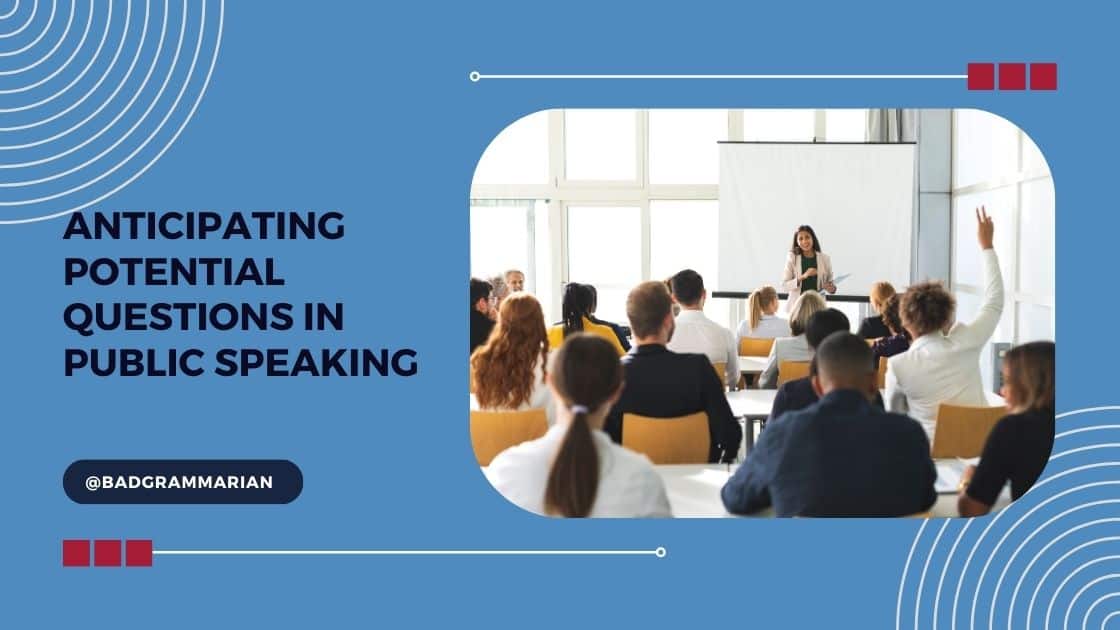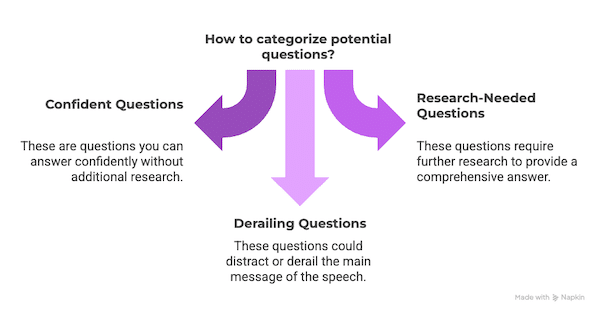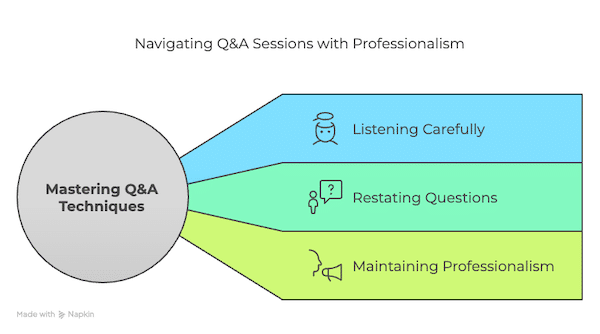Best Noise-Canceling Headphones for Writers: Enhance Focus and Creativity
Anticipating Potential Questions in Public Speaking: The Ultimate Guide

The art of public speaking extends far beyond delivering a well-crafted speech. One of the most challenging yet crucial aspects is anticipating potential questions—a skill that separates good speakers from truly exceptional ones. Your ability to predict and prepare for audience questions can dramatically enhance your credibility and effectiveness. This comprehensive guide will explore how to anticipate questions before they arise, manage them professionally when they do, and use this interaction to strengthen your overall message.
Why Anticipating Potential Questions in Public Speaking Matters
Before diving into the how-to, let's understand why this skill is essential. When you successfully anticipate potential questions in public speaking:
- You demonstrate thorough knowledge of your subject
- You appear more confident and prepared
- You maintain control of your presentation's narrative
- You build stronger connections with your audience
- You transform potentially challenging moments into opportunities to reinforce your message
Research shows that audiences remember 40% more information when speakers effectively address their questions and concerns. This makes question anticipation not just a defensive strategy but a powerful tool for enhancing your message retention.
The Preparation Phase: Anticipating Questions Before Your Speech
The foundation of anticipating potential questions in public speaking begins long before you step onto the stage. Effective preparation is crucial.
Brainstorming All Possible Questions
Start by putting yourself in your audience's shoes. As one public speaking expert recommends, “Ask yourself all possible questions concerning your topic during preparation.” This exercise helps you identify potential knowledge gaps or points of confusion.
Create three columns on a sheet of paper:
- Questions you're confident about answering
- Questions that might require additional research
- Questions that could potentially derail your message
Pay special attention to items in the second and third categories. These represent your greatest opportunities for preparation.

The Bucket Method: Categorizing Potential Questions
Rather than trying to memorize answers to hundreds of specific questions (an impossible task), experienced speakers prepare for categories or “buckets” of questions. This strategic approach allows you to be ready for virtually any question that might arise.
For example, if you're presenting a new product, your question buckets might include:
- Questions about price and value
- Questions about features and specifications
- Questions about implementation or usage
- Questions comparing your product to competitors
- Questions about support and maintenance
For each bucket, prepare a general framework for your response that can be tailored to specific questions. This method allows you to address unexpected questions while maintaining consistency in your messaging.
Knowing Your Audience's Needs
Understanding what your audience needs to know is fundamental to anticipating their questions. Before your presentation, ask yourself:
- What is this specific audience's background knowledge on my topic?
- What aspects of my presentation might be unfamiliar or complex to them?
- What objections or concerns might they naturally have?
- What information would make my proposal more compelling to this particular group?
The better you understand your audience, the more accurately you can predict their questions and concerns.
Mastering the Q&A: Professional Techniques for Handling Questions
Even with thorough preparation, the actual Q&A session requires specific skills to navigate effectively.

Listening Carefully to the Question
One of the most common mistakes speakers make is answering what they think was asked rather than what was actually asked. When someone poses a question:
- Give them your full attention
- Maintain eye contact
- Avoid mentally formulating your response while they're still speaking
- Note key words or “triggers” that help you categorize the question
Effective listening not only helps you provide better answers but also demonstrates respect for your audience.
Restating the Question for Clarity
Restating or paraphrasing the question serves multiple purposes:
- It ensures you've understood correctly
- It allows everyone in the audience to hear the question
- It gives you a moment to organize your thoughts
- It helps you frame the question in a way that connects to your prepared “buckets”
When restating, use phrases like:
- “If I understand correctly, you're asking about…”
- “Your question about [topic] is important because…”
- “What I hear you asking is…”
This technique is particularly valuable when dealing with complex or multi-part questions.
Being Respectful and Professional
How you respond to questions—especially challenging ones—can have a greater impact than the content of your prepared speech. Always:
- Thank the questioner for their input
- Acknowledge the validity of their perspective
- Avoid defensive language or tone
- Maintain composure, even when faced with hostile questions
- Answer concisely, then check if you've addressed their concern
Remember that your professionalism during the Q&A session leaves a lasting impression on your audience, not just the person asking the question.
Advanced Strategies for Anticipating Potential Questions in Public Speaking
For those looking to master this aspect of public speaking, consider these advanced techniques.
Reframing Questions to Your Advantage
The “bucket method” mentioned earlier isn't just about categorization but also strategic reframing. When you receive a question, identify its category and frame your response to highlight your key messages.
For example, if asked why your product costs more than a competitor's, you can reframe this as an opportunity to discuss value rather than just price: “That's an excellent question about investment value. While our initial price point is higher, our customers typically see a 40% reduction in long-term maintenance costs…”
Preparing for the Five Most Challenging Questions
While you should anticipate many questions, pay special attention to preparing for the five most difficult questions you might face. These typically include:
- Questions that challenge your core premise
- Questions about weaknesses or limitations
- Requests for specific data you might not have memorized
- Questions comparing your proposal unfavorably to alternatives
- Questions that introduce information you weren't aware of
For each of these challenging questions, prepare not just an answer but a transition that brings the conversation back to your main message.
Using Anticipated Questions to Strengthen Your Presentation
Sometimes, the best strategy is to address potential questions before they're even asked. By incorporating answers to commonly anticipated questions within your presentation, you:
- Demonstrate foresight and thorough knowledge
- Reduce interruptions during your flow
- Control how the information is presented
- Appear more credible and prepared
For example: “You might wonder how this approach affects timeline and budget. Let me address that now…”
The Psychology Behind Anticipating Questions
Understanding the psychological aspects of questions can enhance your preparation and response strategies.
Why People Ask Questions
Questions typically stem from:
- The desire for clarification on something that wasn't fully understood
- Skepticism about facts or claims presented
- Personal concerns about how the information affects them
- The need to demonstrate their own knowledge or experience
- Genuine curiosity about related topics
Recognizing these motivations helps you prepare more targeted and effective responses.
The Hidden Question Behind the Question
Often, the stated question isn't the real concern. For example, when someone asks about technical specifications, they might be concerned about reliability. When they question your timeline, they might be worried about workflow disruption.
Skilled speakers learn to identify and address these underlying concerns even when they are not explicitly stated in the question.
Practical Examples of Anticipating Potential Questions in Public Speaking
Example 1: Product Launch Presentation
If you're launching a product at a higher price point than competitors, anticipate questions about cost justification. Prepare by:
- Identifying the “price” category of questions
- Preparing value-focused responses that highlight long-term savings
- Having specific examples or case studies ready that demonstrate ROI
- Anticipating comparison questions to specific competitor products
Example 2: Organizational Change Announcement
When announcing significant changes, anticipate questions about personal impact. Prepare by:
- Creating “bucket” responses for questions about timelines, job security, and process changes
- Having both general frameworks and specific examples ready
- Preparing compassionate responses that acknowledge concerns while reinforcing the necessity of change
- Anticipating and preparing for emotional reactions disguised as questions
Building Your Question Anticipation Muscle
Anticipating potential questions in public speaking is not an innate talent but a skill developed through deliberate practice and preparation. By implementing the strategies outlined in this guide—from thorough preparation and categorization to respectful listening and strategic reframing—you can transform the Q&A portion of your presentations from a source of anxiety to an opportunity to reinforce your message.
Remember that effective public speakers don't try to memorize answers to hundreds of specific questions. Instead, they prepare frameworks for categories of questions, deeply understand their audience, and approach the interaction respectfully and professionally.
The next time you prepare for a presentation, allocate dedicated time to anticipate potential questions. Your confidence, credibility, and speaking effectiveness will significantly improve.
Your Next Steps
Ready to enhance your question anticipation skills? Start with your next presentation by:
- Dedicating at least 25% of your preparation time to anticipating questions
- Creating 3-5 “buckets” for the most likely question categories
- Practicing your listening and restatement techniques with a colleague
- Recording yourself answering challenging questions to review your body language and tone
What question preparation techniques have worked best for you?
For more insights on public speaking, check out our list of best books on public speaking or take an online course on public speaking.
Yes! I want Bad Grammarian updates and promotions!
No Spam Zone. We will never spam or sell your email address!
Yes! I want Bad Grammarian updates and promotions!
No Spam Zone. We will never spam or sell your email address!


